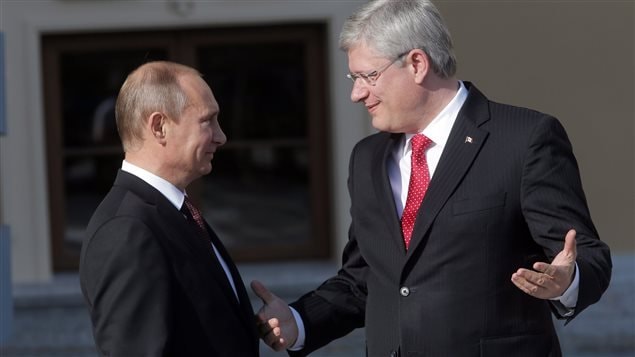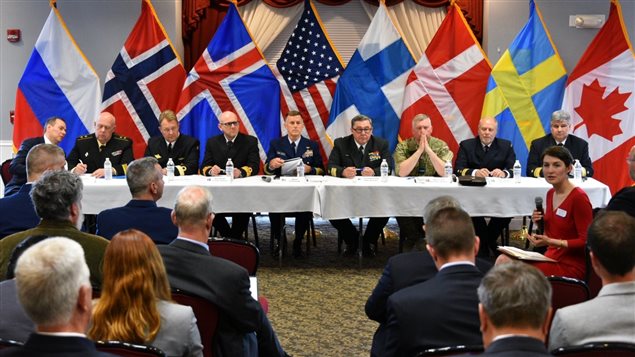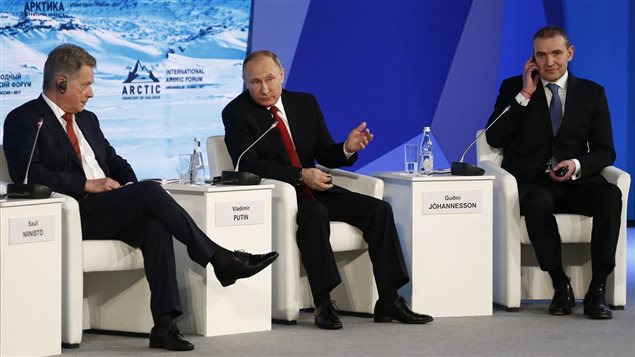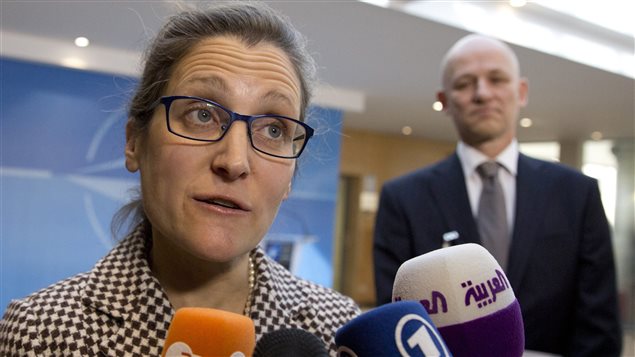Canada’s Foreign Affairs Minister Chrystia Freeland says she is ready to meet her Russian counterpart Sergey Lavrov at the upcoming Arctic Council ministerial meeting in Alaska in May, to discuss bilateral relations and co-operation in the Arctic.
That’s a sudden about-face, given Canada’s snub of the Russians by failing to send any political representation to Arkhangelsk, where the International Arctic Forum ended this week.
Speaking to reporters from Brussels, where she attended the NATO foreign ministers meeting on Friday, Freeland said she’s “very much looking forward to attending” the Arctic Council meeting in Fairbanks.
“I believe that Sergey Lavrov will be there and that would be a very valuable opportunity for all Arctic countries very much, including Canada, to talk about our shared interests in the Arctic region,” Freeland said, responding to a question from Radio Canada International. “And I would be absolutely prepared to have a bilateral meeting with Sergey Lavrov at Arctic Council if that works for both of our schedules.”
Freeland said she already had an opportunity to “chat” with Lavrov last November at the sidelines of the APEC summit in Lima, Peru, and at the G20 foreign ministers meeting in Bonn, Germany, in mid-February.
Crimean freeze

The frosty relations between the two Arctic neighbours plunged to new lows under Stephen Harper’s Conservative government in 2014, following Russia’s annexation of Crimea and its covert support for pro-Russian rebels in parts of Eastern Ukraine.
Canada, home to about 1.3 million Ukrainians and the first country to recognize Ukraine’s independence, froze nearly all political and military contacts with Russia, with the notable exception of co-operation in the Arctic.
The Liberal government of Prime Minister Justin Trudeau came in at the end of 2015, saying that re-engagement with Russia was one of its foreign policy objectives.
No thaw in sight
Many analysts at the time believed that Arctic co-operation between Canada and Russia, which survived the deep freeze of relations between Moscow and Ottawa, could serve as a perfect platform for a diplomatic thaw.

However, Russia’s continued meddling in Ukraine and Canada’s decision to lead a 1,000-strong NATO battle group in Latvia made the prospects of a quick Canadian-Russian rapprochement increasingly unlikely, especially after Trudeau turfed Stéphane Dion from the foreign affairs portfolio. Dion, the main cabinet champion of normalizing relations with Russia, was replaced with Freeland in January.
Freeland, a 49-year-old former journalist, speaks fluent Russian and Ukrainian and is a fierce critic of the Kremlin. She is on the list of 13 Canadian politicians and activists barred by Moscow from entering Russia because of her pro-Ukrainian activism.
Harder line towards Moscow
In February, the newly minted minister’s feud with the Kremlin got even more personal after a Russian investigative journalist published a story accusing Freeland of essentially whitewashing the story of her Ukrainian maternal grandfather.
The story alleged that Freeland’s grandfather was an editor of a virulently anti-Semitic Ukrainian nationalist newspaper that actively collaborated with the Nazis in German-occupied Poland during WWII.
While Freeland did not dispute the fact that her grandfather had worked at the Nazi-sanctioned newspaper, the story was seen in Canada as a crude attempt by Moscow to discredit her and interfere in the Canadian political process.
Then in early March, Freeland announced that Canada is officially extending its military training mission in Ukraine by another two years, until the end of March 2019.
Arkhangelsk snub

Ottawa also decided not to send a cabinet minister to represent Canada at the International Arctic Forum hosted by President Vladimir Putin in Arkhangelsk, which wrapped up Thursday.
Unlike its NATO allies Norway and Denmark, who dispatched their foreign ministers to Arkhangelsk, Canada was represented by a senior foreign affairs bureaucrat in charge of the Arctic file, Alison LeClaire.
Norwegian Foreign Affairs Minister Børge Brende met with Lavrov on the sidelines of the Forum, while Finland’s President Sauli Niinistö and Iceland’s President Guðni Jóhannesson participated in a panel discussion with Putin.
A message of unity
Freeland said Russia was one of the main topics discussed at the meeting of NATO foreign ministers in Brussels.
“Issues on the agenda primarily were Russia, Ukraine, counterterrorism and burden sharing,” Freeland said. “On Ukraine, I spoke about Canada’s strong commitment to an independent, sovereign and prosperous Ukraine.”
She also spoke about the battle group that Canada will be leading in Latvia, as part of a 4,000-strong NATO-enhanced presence in Estonia, Latvia, Lithuania and Poland, to shore the defences on NATO’s northeastern flank against a possible Russian threat, Freeland said.
“It was a very good and very frank conversation,” Freeland said. “I have to say the message that I take from the meeting today is that there is strong trans-Atlantic unity in NATO, strong unity of all the NATO allies.”







For reasons beyond our control, and for an undetermined period of time, our comment section is now closed. However, our social networks remain open to your contributions.